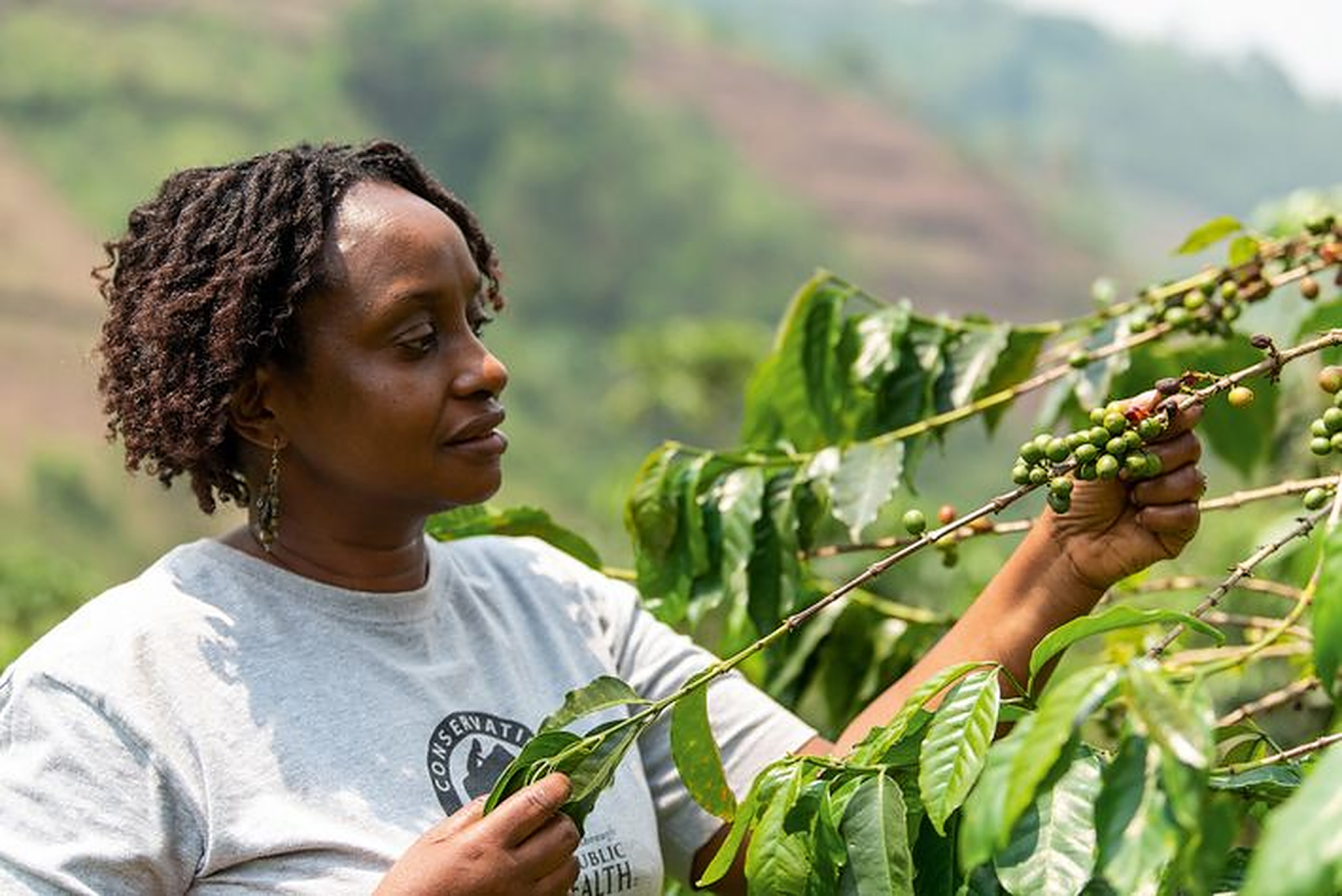Memoir of a Wild Life
Written by Marian Starkey | Published: March 13, 2023
Review of Walking With Gorillas: The Journey of an African Wildlife Vet by Dr. Gladys Kalema-Zikusoka
A species of ape that was predicted to go extinct before the turn of the century now numbers over 1,000 in the wild. Mountain gorillas have made a comeback, welcoming 15 new babies in 2022 alone, and that’s in no small part due to decades of determination and creative and compassionate problem solving by Dr. Gladys Kalema-Zikusoka, Founder and CEO of Conservation Through Public Health (CTPH). Her organization was Population Connection’s first Global Partner, and our pride in supporting CTPH has only grown since we made our first contribution in 2016. In 2021, Dr. Gladys became a member of the Population Connection Board of Directors, further strengthening our connection to her remarkable work.
After nearly three decades of working as a wildlife veterinarian in Uganda, Dr. Gladys has recounted her early life and accolade-laden career in a memoir, to be released on March 14 by Skyhorse Publishing, Inc. Walking With Gorillas: The Journey of an African Wildlife Vet features tear-jerking recollections of dear animal friends, empowering stories about being the only woman in graduate courses and on gorilla tracking expeditions, and heartwarming accounts of the heroes and mentors who inspired and helped her along her way.
I’ve known Dr. Gladys for 16 years, but it took reading her memoir to learn that her beloved father was murdered by the maniacal regime of Idi Amin when she was a toddler. This grim chapter of Uganda’s history is recounted through memories of Dr. Gladys’s childhood during Amin’s reign in the 1970s. Perhaps it was her experience of being raised, along with her siblings, by a widowed single mother who still managed a career as a respected political leader that gave her the confidence to pursue her somewhat unusual passion toward helping gorillas and other wildlife thrive in their natural habitats.
Her journey from amateur animal lover to world class wildlife veterinarian started with a rigorous education in veterinary science at the University of London and at North Carolina State University, where she met her husband, Lawrence, also from Uganda. She started working in Bwindi Impenetrable National Park, home to about half the world’s mountain gorillas, in the early 1990s, soon after it was declared a UNESCO World Heritage Site. The park is surrounded by densely populated human settlements, which have encroached into areas that were previously gorilla habitat, causing sometimes violent conflict between the two species.
The program model that has made the conservation goals of CTPH so successful focuses on human health and livelihoods. When people are hungry and ill, they tend not to extend sympathy to the plight of gorillas and other wildlife ranging on the borders of their settlements—especially when local folklore tells them that eating gorilla meat will cure what ails them. But when people have access to culturally sensitive health care and jobs that depend on the well-being of local wildlife, they have a vested stake in protecting it. Now that locals are able to make a living as park rangers, tour operators, coffee growers*, and crafters, they don’t need to capture baby animals to sell as pets or poach bush meat to eat or sell as food, and they don’t react to gorillas entering their gardens with violence, because doing so would directly harm their ability to earn an income. The CTPH model enables people to be rewarded for looking out for their once adversaries and prey.
Because gorillas share 98.4 percent of our DNA, they are susceptible to many of the same diseases as humans (and vice versa). To date, there have been no known cases of Covid-19 among Bwindi’s mountain gorillas, due to the strict masking and distancing requirements adopted during the pandemic. But the gorillas weren’t always so well protected from human illnesses. A scabies outbreak among gorillas, contracted through contact with dirty clothing used for scarecrows, was Dr. Gladys’s first moment of realization that in order to keep gorillas healthy, the humans who lived adjacent to their habitats must also be healthy. Cholera and typhoid were common among people and often passed on to gorillas as well, due to the practice of open defecation. In response, community toilets and hand-washing stations were introduced—a straightforward and very effective solution.
The CTPH health and conservation solutions that have worked best, Dr. Gladys writes, are the ones proposed by local community members, giving them ownership over the educational workshops, public health services, and human/gorilla conflict resolution strategies CTPH staff have implemented. Traditional healers are asked to help neighbors remember to take their medications, from tuberculosis pills to birth control pills, the latter being a newer addition to the CTPH suite of services. Dr. Gladys refrained from incorporating family planning until the organization was well established and had developed credibility among the rural communities it served. Only then did she trust that people would be receptive to such a sensitive intervention.
In fact, they’ve been so receptive, birth rates have dropped in the communities with CTPH family planning programs more than they’ve dropped in Uganda on average. Dr. Gladys and Lawrence, who chose to limit their family to two children in order to only replace themselves, are effective role models when they visit communities with their happy, healthy, well-educated sons.
We hope that you’ll purchase and read this inspiring memoir and that you’ll join us for our Page Turners book club meeting on May 9 to discuss it—Dr. Gladys will be joining us as a special guest! To get you started, the following pages contain a reprint of the chapter in Walking With Gorillas that describes the introduction and immense influence of the CTPH family planning program.
* Some readers may recall receiving a bag of Gorilla Conservation Coffee, grown by farmers in the Bwindi Coffee Growers Cooperative, as Population Connection placed CTPH’s first bulk order to share as membership premiums!

